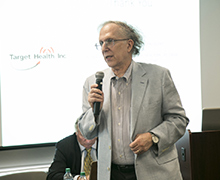news
“The Improvement of Health is Connected to Technological Advances that have Decreased the Cost of Crucial Medicine” States Director of World Health Organization during GFDD UN Event on Affordable Treatment
June 30, 2017
GFDD partnered with the United Nations Association of the United States of America Council of Organizations (UNA USA COO) and the Institute for Life Sciences Collaboration to host an International Conference on Novel Diagnostics & Affordable Treatment. The event, titled Advancing UN Sustainable Development Goal 3 (Good Health & Well-being) took place at the UN Church Center and was a unique opportunity for attendees to engage with a diverse panel of speakers
that included high-level representatives from the World Health Organization, the World Bank and several medical practitioners. The conference, which took place before an audience of 80 people, was split into three parts including two panel discussions on Diagnostic Challenges of Resurging Diseases and Applicable Affordable Treatments and a networking session. The panelists discussed a wide range of ongoing public health issues in developing countries, from tropical virus outbreaks and their
interrelation with climate change, to the prevalence of pandemics such as tuberculosis or rabies, offering effective yet affordable solutions to help tackle them.
Aaron Etra, Chair of the UN Association of the USA, Council of Organizations provided the words of welcome, thanking everyone for
attending. Dr. Nata Menabde, Executive Director of the World Health Organization Office (WHO) at the United Nations then took the floor to stress the importance of good health and its benefits for sustainable development. She explained, “Good health is an indicator of development. It is a precondition for our success and any other goal we wish to achieve”…“We need to think beyond survival. Innovation will play its role in seeing future generations
thrive”, impressing upon the audience the importance of updating technology and finding ways to make medication affordable and available to all persons in danger of diseases like malaria, diarrhea or even lung cancer.
“It is estimated that climate change can drive a hundred million people back into extreme poverty” underscored Dr. Rama Lakshminarayanan, Senior Health Specialist for the World Bank Group as she provided remarks on the
interconnection between climate change and public health. Dr. Rama expressed her delight in observing the increasing international mobilization over the past three years, illustrated through the implementation by the World Bank Group of the first international program to address the impacts of climate change.
Following these key note remarks, Dr. Joann Halpern, Director, German Center for Research and Innovation and Adjunct Professor of International Education at New York
University and moderator of the first panel reminded participants of the title of the panel: Diagnostic Challenges of Resurging Diseases and Special Circumstances, and quickly gave the floor to speakers to let them fully develop their presentations.
Dr. Jules T. Mitchel, President of Target Health
dealt with repurposing of existing drugs. “Our goal is to find out the mechanism of how certain diseases work” he insisted. Furthermore, he noted the difficulties faced by small companies in taking their products to the market.
Finally, Dr. Norman Gray, Carlton Highsmith Chair of Innovation and Entrepreneurship completed the discussion by developing about consequential globalization of diseases. “In order to mitigate human and financial
losses as a result of global pandemics, we must plan now” he alerted, providing examples of plans around the world, and insisting on the real global risks.
After a 5-minute break Mr. David Luke moderated the second panel discussion. Mr. Rick Flath, President of ILSC opened the floor to discuss funding and the benefits of public private partnerships. Another Associate Professor of Medicine at The Frank H. Netter School of Medicine, Dr. Steve Scholand participated
in the panel discussion, dealing with the fear around rabies. “We want to raise awareness for a rabies free world” he called, encouraging the global community to move forward to once and for all eradicate rabies. Addressing the topic of Antibiotic Resistance, Prof. Barry Kreiswirth, Professor of Medicine at Rutgers University, and Director of the TB Center described the importance of this global issue. He stressed that 2 million people each year acquire antibiotic
resistant infections, and 23,000 people die due to having developed antibacterial resisting infections. “We need global commitment to combat this issue,” he concluded. Finally, Prof. Koraljka Gall Troselj of the Rudjer Boskovic Institute developed about a personalized approach to Cancer Therapy. She gave the participants a quick overview of the global impacts of cancer worldwide.
“14 million people are diagnosed with cancer each year and 8
million people die of it” she explained, pointing to the complexity of the disease including 33 distinct types of cancer.
Closing this exceptional event, Marc Jourdan, UN Program Manager of GFDD and Vice-Chair of the Council of Organizations of UNA-USA, thanked both the speakers and the audience for this exceptional 4-hour session, and opened a networking session to encourage the creation of new partnerships.
Presentations:
Dr Nata Menabde, Executive Director of the WHO Office at the United Nations.
Dr. Rama Lakshminarayanan, MD, MBA, Senior Health Specialist- World Bank Group.
Dr. Jules T. Mitchel, PhD, MBA, President, Target Health.
Dr. Richard Lutes, MD, President, Angam Scientific.
Dr. Steve Scholand, MD, Associate Professor of Medicine at The Frank H. Netter School of Medicine in North Haven, CT.
Prof. Norman Gray, PhD Carlton Highsmith Chair of Innovation and Entrepreneurship.
Mr. Rick Flath, President, Institute for Life Sciences Collaboration.
Prof. Barry Kreiswirth, Prof. of Medicine, Rutgers University, Director, TB Center.
Prof. Koraljka Gall Troselj, Head, Laboratory of Epigenomics, Rudjer Boskovic Institute.
Dr. David R Luke, Senior Director of Clinical and Scientific Affairs at Target Health Inc.
Dr. Joann Halpern, Director of GCRI and Adjunct Professor of International Education, New York University.







